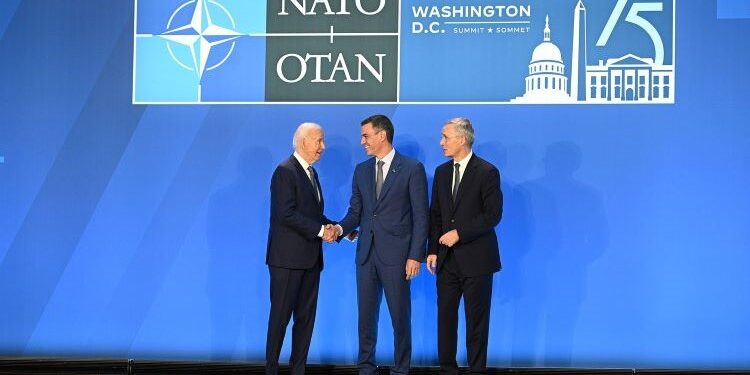Eduardo González
The President of the Government, Pedro Sánchez, yesterday celebrated the adoption of an action plan for the Southern Flank by the NATO Summit and assured that the allies will be able to count on "the firm support of Spain" in the implementation of the plan. over the next few years.”
“The Middle East, North Africa, the Sahel, the African continent in general, are of great strategic importance for peace and security in the Euro-Atlantic region and, of course, the Alliance can do a lot in turn to strengthen security and the stability of southern Europe,” declared Sánchez during his speech at the NATO Public Forum, within the framework of the Alliance Summit, which will be held from this Tuesday and will conclude today in Washington. Pedro Sánchez's activity in Washington began on Tuesday night with his participation in the event celebrating the 75th anniversary of NATO, to which Spain has belonged since 1982.
“Spain is one of the closest allies to that south, not only geographically, but due to the intensity of our political, economic and human ties with the region, and we have always understood that our well-being depends on the well-being of our neighbors to the south,” continued during the Forum.
“Instability in the south is a threat to NATO allies,” Sánchez warned. “Our adversaries do not hesitate to use the instability in those neighboring countries to the south and east of NATO against us” and work “with non-state actors to amplify the effects of terrorism, maritime insecurity or the consequences of climate change,” all with the aim of “weakening Euro-Atlantic security by creating a semicircle of instability around us,” he added.
According to the head of the Executive, “Russia is developing links between eastern and southern instability through human trafficking organizations, terrorist networks and coordinated disinformation campaigns against NATO in many African and Middle Eastern countries.” “Thousands of people drown in the Atlantic or the Mediterranean after falling into the hands of human trafficking networks,” he lamented.
“The cost of these hybrid tactics is traumatic and, therefore, NATO needs to develop a comprehensive strategy to promote stability and good governance on the Southern Flank and work with these countries to strengthen their defense and security institutions, helping them to develop capabilities, and with practical measures of cooperation, all based on mutual respect,” he said.
The action plan
For this reason, Pedro Sánchez celebrated that, "after two years of preparations", NATO allies have adopted "an action plan to strengthen our approach to the south." “This is great news, because for the first time the Alliance is going to have a practical, detailed and broad roadmap to work for our southern partners,” he highlighted.
The joint declaration adopted yesterday after the meeting of heads of state and government of the North Atlantic Council, warns of the need to "promote greater security and stability in the Middle East and Africa, contributing to peace and prosperity in the region" . “In Vilnius (where the 2023 Summit was held), we launched a comprehensive reflection on the threats, challenges and opportunities in the south and today (yesterday) we adopted an action plan for a stronger, more strategic and oriented towards results towards our southern neighborhood, which will be updated periodically,” the text continues.
According to Sánchez, “NATO must especially coordinate its actions with the EU, especially now that both organizations have undertaken collaboration programs with their southern neighbors.” “The implementation of the plan over the next few years will be key, and this is a difficult task in which you can always count on the firm support of Spain, which is already working in many of these fields with our neighbors and partners in the south. and we are ready to expand these efforts in the context of cooperation within NATO,” he concluded.
Defense spending
The meeting of the North Atlantic Council, in which only the heads of State and Government of the allied countries and the Secretary General of NATO, Jens Stoltenberg, participated. addressed the strengthening of the Alliance's Deterrence and Defense posture, support for Ukraine and its future membership in NATO and the commitment to defense investment, apart from the action plan for the South.
During his speech in the Council, Pedro Sánchez described as “irreversible” the process for Ukraine to become part of “the Euro-Atlantic family” and affirmed that the support approved yesterday is “a bridge” towards its entry into NATO.
The meeting also allowed for a collective assessment regarding compliance with the defense investment commitment. In this sense, the President of the Government assured that Spain has a "clear commitment" to the objective of two percent of defense spending on GDP and a path to achieve it in 2029.
According to the Government, since 2016, the real growth in defense spending is 77% in eight years, almost ten percent annually. Furthermore, Spain exceeds the 20% percentage of investment in new systems, dedicating 30.3% to major equipment and R&D, and maintains a very notable contribution to NATO missions, with 1,945 soldiers deployed only in operations of the Alliance.
Bilateral meetings
On the sidelines of the Summit, Sánchez held a bilateral meeting yesterday with the Prime Minister of Norway, Jonas Gahr Støre, with whom he addressed the situation in the Middle East and recalled that both countries “have taken a historic step in favor of peace and justice with the recognition of the State of Palestine”, as declared by the head of the Executive through the social network X.
Likewise, he met with the Prime Minister of Montenegro, Milojko Spajić, to whom he conveyed his recognition “for the reforms that the country is carrying out on its path to accession to the European Union” and to whom he assured that “Montenegro has the support from Spain.”
...







